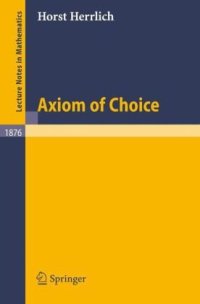
Ebook: Axiom of Choice
Author: Horst Herrlich (auth.)
- Genre: Mathematics // Logic
- Tags: Mathematical Logic and Foundations, General Algebraic Systems, Functional Analysis, Game Theory Economics Social and Behav. Sciences, Combinatorics, Topology
- Series: Lecture Notes in Mathematics 1876
- Year: 2006
- Publisher: Springer-Verlag Berlin Heidelberg
- City: Berlin; New York
- Edition: 1
- Language: English
- pdf
AC, the axiom of choice, because of its non-constructive character, is the most controversial mathematical axiom, shunned by some, used indiscriminately by others. This treatise shows paradigmatically that:
- Disasters happen without AC: Many fundamental mathematical results fail (being equivalent in ZF to AC or to some weak form of AC).
- Disasters happen with AC: Many undesirable mathematical monsters are being created (e.g., non measurable sets and undeterminate games).
- Some beautiful mathematical theorems hold only if AC is replaced by some alternative axiom, contradicting AC (e.g., by AD, the axiom of determinateness).
Illuminating examples are drawn from diverse areas of mathematics, particularly from general topology, but also from algebra, order theory, elementary analysis, measure theory, game theory, and graph theory.
AC, the axiom of choice, because of its non-constructive character, is the most controversial mathematical axiom, shunned by some, used indiscriminately by others. This treatise shows paradigmatically that:
- Disasters happen without AC: Many fundamental mathematical results fail (being equivalent in ZF to AC or to some weak form of AC).
- Disasters happen with AC: Many undesirable mathematical monsters are being created (e.g., non measurable sets and undeterminate games).
- Some beautiful mathematical theorems hold only if AC is replaced by some alternative axiom, contradicting AC (e.g., by AD, the axiom of determinateness).
Illuminating examples are drawn from diverse areas of mathematics, particularly from general topology, but also from algebra, order theory, elementary analysis, measure theory, game theory, and graph theory.